Citibank 2010 Annual Report Download - page 275
Download and view the complete annual report
Please find page 275 of the 2010 Citibank annual report below. You can navigate through the pages in the report by either clicking on the pages listed below, or by using the keyword search tool below to find specific information within the annual report.-
 1
1 -
 2
2 -
 3
3 -
 4
4 -
 5
5 -
 6
6 -
 7
7 -
 8
8 -
 9
9 -
 10
10 -
 11
11 -
 12
12 -
 13
13 -
 14
14 -
 15
15 -
 16
16 -
 17
17 -
 18
18 -
 19
19 -
 20
20 -
 21
21 -
 22
22 -
 23
23 -
 24
24 -
 25
25 -
 26
26 -
 27
27 -
 28
28 -
 29
29 -
 30
30 -
 31
31 -
 32
32 -
 33
33 -
 34
34 -
 35
35 -
 36
36 -
 37
37 -
 38
38 -
 39
39 -
 40
40 -
 41
41 -
 42
42 -
 43
43 -
 44
44 -
 45
45 -
 46
46 -
 47
47 -
 48
48 -
 49
49 -
 50
50 -
 51
51 -
 52
52 -
 53
53 -
 54
54 -
 55
55 -
 56
56 -
 57
57 -
 58
58 -
 59
59 -
 60
60 -
 61
61 -
 62
62 -
 63
63 -
 64
64 -
 65
65 -
 66
66 -
 67
67 -
 68
68 -
 69
69 -
 70
70 -
 71
71 -
 72
72 -
 73
73 -
 74
74 -
 75
75 -
 76
76 -
 77
77 -
 78
78 -
 79
79 -
 80
80 -
 81
81 -
 82
82 -
 83
83 -
 84
84 -
 85
85 -
 86
86 -
 87
87 -
 88
88 -
 89
89 -
 90
90 -
 91
91 -
 92
92 -
 93
93 -
 94
94 -
 95
95 -
 96
96 -
 97
97 -
 98
98 -
 99
99 -
 100
100 -
 101
101 -
 102
102 -
 103
103 -
 104
104 -
 105
105 -
 106
106 -
 107
107 -
 108
108 -
 109
109 -
 110
110 -
 111
111 -
 112
112 -
 113
113 -
 114
114 -
 115
115 -
 116
116 -
 117
117 -
 118
118 -
 119
119 -
 120
120 -
 121
121 -
 122
122 -
 123
123 -
 124
124 -
 125
125 -
 126
126 -
 127
127 -
 128
128 -
 129
129 -
 130
130 -
 131
131 -
 132
132 -
 133
133 -
 134
134 -
 135
135 -
 136
136 -
 137
137 -
 138
138 -
 139
139 -
 140
140 -
 141
141 -
 142
142 -
 143
143 -
 144
144 -
 145
145 -
 146
146 -
 147
147 -
 148
148 -
 149
149 -
 150
150 -
 151
151 -
 152
152 -
 153
153 -
 154
154 -
 155
155 -
 156
156 -
 157
157 -
 158
158 -
 159
159 -
 160
160 -
 161
161 -
 162
162 -
 163
163 -
 164
164 -
 165
165 -
 166
166 -
 167
167 -
 168
168 -
 169
169 -
 170
170 -
 171
171 -
 172
172 -
 173
173 -
 174
174 -
 175
175 -
 176
176 -
 177
177 -
 178
178 -
 179
179 -
 180
180 -
 181
181 -
 182
182 -
 183
183 -
 184
184 -
 185
185 -
 186
186 -
 187
187 -
 188
188 -
 189
189 -
 190
190 -
 191
191 -
 192
192 -
 193
193 -
 194
194 -
 195
195 -
 196
196 -
 197
197 -
 198
198 -
 199
199 -
 200
200 -
 201
201 -
 202
202 -
 203
203 -
 204
204 -
 205
205 -
 206
206 -
 207
207 -
 208
208 -
 209
209 -
 210
210 -
 211
211 -
 212
212 -
 213
213 -
 214
214 -
 215
215 -
 216
216 -
 217
217 -
 218
218 -
 219
219 -
 220
220 -
 221
221 -
 222
222 -
 223
223 -
 224
224 -
 225
225 -
 226
226 -
 227
227 -
 228
228 -
 229
229 -
 230
230 -
 231
231 -
 232
232 -
 233
233 -
 234
234 -
 235
235 -
 236
236 -
 237
237 -
 238
238 -
 239
239 -
 240
240 -
 241
241 -
 242
242 -
 243
243 -
 244
244 -
 245
245 -
 246
246 -
 247
247 -
 248
248 -
 249
249 -
 250
250 -
 251
251 -
 252
252 -
 253
253 -
 254
254 -
 255
255 -
 256
256 -
 257
257 -
 258
258 -
 259
259 -
 260
260 -
 261
261 -
 262
262 -
 263
263 -
 264
264 -
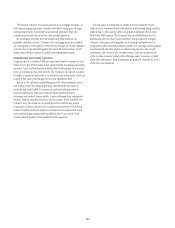 265
265 -
 266
266 -
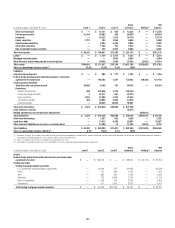 267
267 -
 268
268 -
 269
269 -
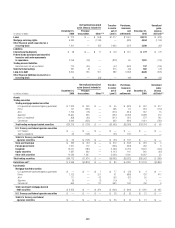 270
270 -
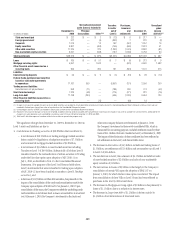 271
271 -
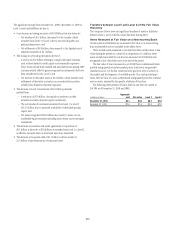 272
272 -
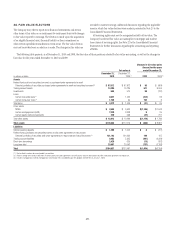 273
273 -
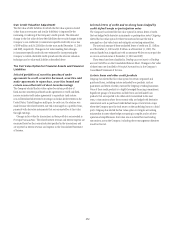 274
274 -
 275
275 -
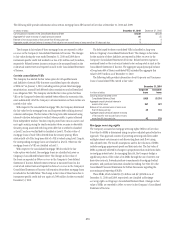 276
276 -
 277
277 -
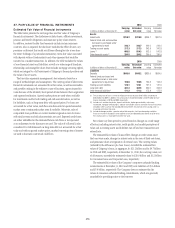 278
278 -
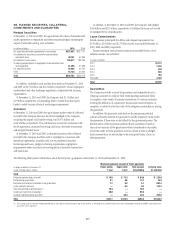 279
279 -
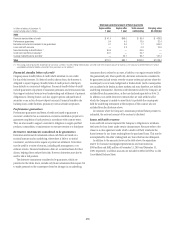 280
280 -
 281
281 -
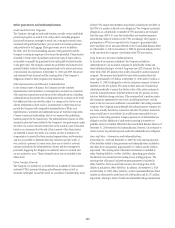 282
282 -
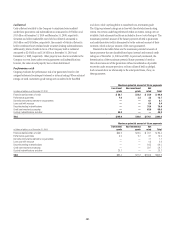 283
283 -
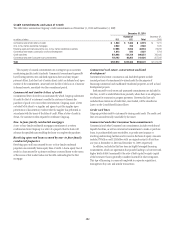 284
284 -
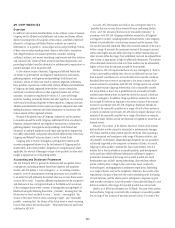 285
285 -
 286
286 -
 287
287 -
 288
288 -
 289
289 -
 290
290 -
 291
291 -
 292
292 -
 293
293 -
 294
294 -
 295
295 -
 296
296 -
 297
297 -
 298
298 -
 299
299 -
 300
300 -
 301
301 -
 302
302 -
 303
303 -
 304
304 -
 305
305 -
 306
306 -
 307
307 -
 308
308 -
 309
309 -
 310
310 -
 311
311 -
 312
312
 |
 |

273
The following table provides information about certain credit products carried at fair value at December 31, 2010 and 2009:
December 31, 2010 December 31, 2009
In millions of dollars Trading assets Loans Trading assets Loans
Carrying amount reported on the Consolidated Balance Sheet $14,241 $1,748 $14,338 $945
Aggregate unpaid principal balance in excess of fair value 167 (88) 390 (44)
Balance of non-accrual loans or loans more than 90 days past due 221 — 312 —
Aggregate unpaid principal balance in excess of fair value for non-accrual loans or loans more than 90 days past due 57 — 267 —
In addition to the amounts reported above, $621 million and
$200 million of unfunded loan commitments related to certain credit
products selected for fair value accounting was outstanding as of
December 31, 2010 and 2009, respectively.
Changes in fair value of funded and unfunded credit products are
classified in Principal transactions in the Company’s Consolidated
Statement of Income. Related interest revenue is measured based on
the contractual interest rates and reported as Interest revenue on
Trading account assets or loan interest depending on the balance sheet
classifications of the credit products. The changes in fair value for the years
ended December 31, 2010 and 2009 due to instrument-specific credit risk
totaled to a loss of $6 million and a gain of $5.9 billion, respectively.
Certain investments in private equity and real estate
ventures and certain equity method investments
Citigroup invests in private equity and real estate ventures for the purpose
of earning investment returns and for capital appreciation. The Company
has elected the fair value option for certain of these ventures, because such
investments are considered similar to many private equity or hedge fund
activities in Citi’s investment companies, which are reported at fair value.
The fair value option brings consistency in the accounting and evaluation of
these investments. All investments (debt and equity) in such private equity
and real estate entities are accounted for at fair value. These investments are
classified as Investments on Citigroup’s Consolidated Balance Sheet.
Citigroup also holds various non-strategic investments in leveraged
buyout funds and other hedge funds for which the Company elected fair
value accounting to reduce operational and accounting complexity. Since
the funds account for all of their underlying assets at fair value, the impact
of applying the equity method to Citigroup’s investment in these funds was
equivalent to fair value accounting. These investments are classified as
Other assets on Citigroup’s Consolidated Balance Sheet.
Changes in the fair values of these investments are classified in Other
revenue in the Company’s Consolidated Statement of Income.
Certain mortgage loans (HFS)
Citigroup has elected the fair value option for certain purchased and
originated prime fixed-rate and conforming adjustable-rate first mortgage
loans HFS. These loans are intended for sale or securitization and are hedged
with derivative instruments. The Company has elected the fair value option
to mitigate accounting mismatches in cases where hedge accounting is
complex and to achieve operational simplifications.
